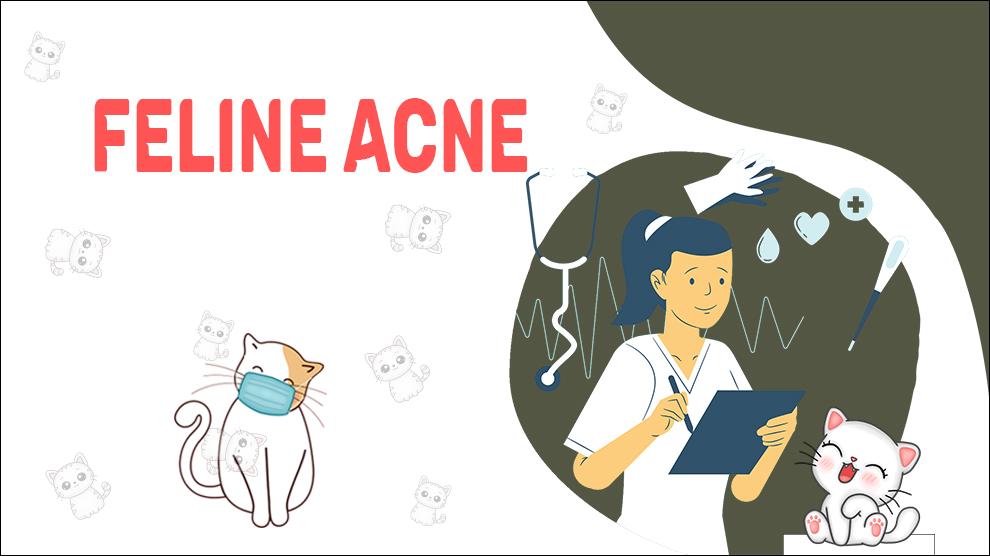What Is Feline Acne?
Feline acne is a skin condition that affects cats, causing blackheads and small bumps to form on the chin and lower lip area.
The condition is caused by clogged hair follicles and can be uncomfortable for the cat.
Treatments include topical or oral antibiotics, antifungal medications, and medicated shampoos. Prevention involves keeping the cat's face clean and avoiding plastic feeding dishes.
Clinical Signs Of Feline Acne
The symptoms of feline acne can vary depending on the severity of the condition.
Common symptoms include:
- Blackheads or small bumps on the chin and lower lip area
- Swelling and inflammation of the affected area
- Itching and scratching at the affected area
- Hair loss in the affected area
- Scabbing or crusting of the affected area
- Redness In Skin
- Bleeding In Skin
- Pustules
- Whiteheads
- Skin Bumps
- Swollen Lips
- Crusting On The Skin
- Pain In Skin
- Skin Lesions
In severe cases, feline acne can lead to secondary bacterial infections, which can cause more serious symptoms such as fever, lethargy, and loss of appetite.
Treatment Options For Feline Acne
Treatment for feline acne depends on the severity of the condition. Mild cases may require only basic at-home care, while more severe cases may require medical intervention.
Treatment options may include:
- Topical or oral antibiotics to control bacterial infections
- Antifungal medications to control fungal infections
- Medicated shampoos to clean the affected area
- Steroid injections to reduce inflammation and itching
- Compresses with warm water to help open clogged pores
- Removal of any foreign objects in the affected area
- Changes to the cat's diet or feeding routine
- Allergy testing and treatment
Home Remedies For Feline Acne
There are several home remedies that may help alleviate the symptoms of feline acne.
These include applying a warm compress to the affected area to help reduce inflammation, using diluted apple cider vinegar to clean the area, and applying aloe vera gel to help soothe and heal the skin.
However, it is important to consult with a veterinarian before trying any home remedies to ensure they are safe and effective.
How To Prevent Feline Acne?
Preventing feline acne involves keeping the cat's face clean and avoiding plastic feeding dishes.
Some tips to help prevent the development of feline acne include:
- Using ceramic, glass, or stainless-steel feeding dishes instead of plastic
- Cleaning the cat's face regularly with a warm, damp cloth
- Grooming the cat regularly to prevent the build-up of oil and debris on the skin
- Providing the cat with a stress-free environment
- Addressing any underlying health conditions that may weaken the cat's immune system
Affected Cat Breeds Of Feline Acne
Feline acne can affect cats of all breeds and ages, but it is more common in certain breeds.
Persians and Himalayans are more prone to developing feline acne due to their long hair and flat faces.
Causes For Feline Acne
Causes:
Feline acne is caused by clogged hair follicles in the chin and lower lip area.
The exact cause of the clogging is unknown, but several factors may contribute to the development of the condition, including:
- Overproduction of sebum (oil) in the skin
- Poor grooming habits
- Use of plastic feeding dishes
- Weakened immune system
- Hormonal imbalances
- Stress and anxiety
Certain cat breeds, such as Persians and Himalayans, may be more prone to feline acne.
When To See A Vet For Feline Acne?
If your cat is exhibiting any symptoms of feline acne, it is important to have them evaluated by a veterinarian.
They can help determine the underlying cause of the condition and recommend an appropriate treatment plan.
Additionally, if the condition is severe or does not respond to treatment, a veterinarian may perform additional tests or refer the cat to a veterinary dermatologist.
Food Suggestions For Feline Acne
Diet can play a role in the development of feline acne, so switching to a hypoallergenic or limited-ingredient diet may help reduce the risk of developing the condition.
It is important to consult with a veterinarian before changing a cat's diet, as some cats may require a specific type of food for their individual needs.
Conclusion
Feline acne is a common skin condition that can cause a variety of symptoms, including bumps, scabs, and redness.
While the exact cause of feline acne is unknown, it is believed to be caused by a combination of factors.
Treatment for feline acne typically involves a combination of topical and systemic medications, and preventing the condition involves minimizing exposure to the contributing factors.











